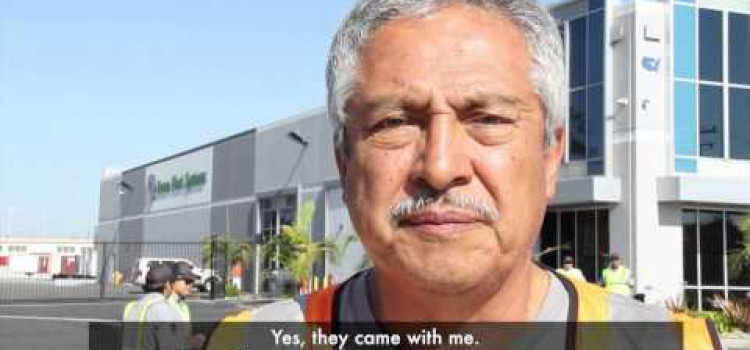

Paco Sanchez drives about 100 miles to get to work at the Long Beach port from his home in Redlands. He then starts his shift as a truck driver with Green Fleet Systems, whom he has worked for over a year.
Since Sanchez emigrated from El Salvador, he has been no stranger to hard work.
“When I came, I was a teenager. I started to work and become accustomed to the ways of this country,” said Sanchez. “Thank God I was able to get my high school diploma.”
His children will soon be getting theirs, too.
Latino immigrants make up many of the estimated 11,000 port drivers, some of who were on strike last week protesting low wages and retaliation for unionizing.
The strike aimed to demonstrate the power they have; they transport $490 million dollars’ worth of goods every single day.
Despite the economic power of the job, the typical port driver in the U.S. works almost 60 hours a week, but makes less than $28,000 a year. That is according to a 2010 National Employment Law Project (NELP) report.
Agustin Cueras, a local port truck driver, was also one of the 120 workers on strike last week. He knew his pocketbook was going to take a hit.
“I’m 100 percent sure this is the only path our employer has left us with– to continue with our struggle and achieve what we want, which is a contract with the union,” Cueras said.
Cueras has been in the U.S. for more than 20 years and came for the same reason many do– to find a better future for his family. But he hasn’t quite achieved the American dream.
“Everything is badly limited,” Cueras said concernedly. “Right now, I need to take my wife to the doctor but I need to wait until next week to take her because my last check has already run out.”
His family neither can afford to buy new clothes or shoes. “They want us to be very professional, but the pay is barely above minimum,” he said.
Originally from Michoacán, Mexico, Cueras has spent two years working at Green Fleet Systems to provide for his wife and two children.
“They came with me when they were young children,” he said. “They’ve always been with me.”
Moises Cardoza, a Long Beach resident from El Salvador, has spent the last four years driving for Green Fleet Systems, but is having problems paying rent. “Food, too, is a problem, but thank God we’re getting by okay,” he said.
The low wages arise from companies designating drivers as independent contractors, and therefore, drivers themselves are responsible for leasing the trucks and paying for truck maintenance. These heavy deductions end up on many drivers’ check stubs.
About 66 percent of U.S. port drivers are “misclassified” as independent contractors, according to NELP.
This can be denying U.S. truck drivers up to $1.4 billion a year in income, money that can go a long way to helping immigrant drivers find that better life they were searching for.
Local truck drivers last held a two-day strike in April when union dockworkers joined them in shutting down a local terminal, costing port business millions.
This past week, similarly, picketing workers delayed and shut multiple terminals. But as for the strike’s effect on operations this time, Port spokesman Lee Peterson said it was too early to tell.
“Trucks (were) still going in and out of the port,” Peterson said. Picketing “(made) it more difficult, but they (were) getting out.”
Nevertheless, the National Retail Federation reported that the port’s projected imports are 4.2 percent higher than usual for July.
The strike ended with a “cooling-off” period late Friday after Los Angeles Mayor Eric Garcetti intervened. The city of Los Angeles said a commission would investigate accusations of unfair labor practices. It is questionable if truck drivers will be getting out of poverty after the strike’s end.
“I drive two hours from Redlands to Long Beach to work here and you don’t know what’s going to happen,” said Green Fleet Systems driver, Yassir Castillo. From El Salvador, Castillo was just 6-years-old when he came to the U.S.
“What I want is to work in a safe place,” Castillo said. “We’ve been threatened to be killed.”
“We need to put an end to this mafia, this mafia the port companies have become,” Cueras shouted.
“No more ten dollar salaries! Por favor muchachos, unise a la lucha! (Please men, unite for the struggle!)”
Below are photos of pay stubs of port truck drivers with deduction, from NELP’s 2014 Report, The Big Rig Overhaul.


